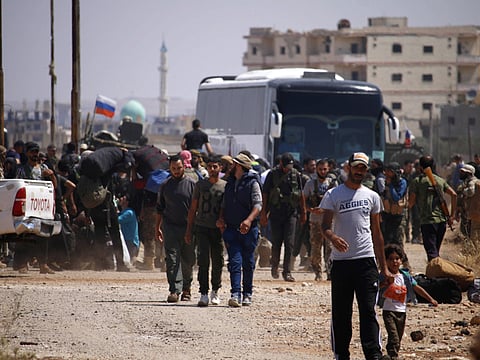Syria rebels begin evacuating ‘cradle’ of uprising in Daraa
An estimated 1,400 people were to be evacuated on Sunday, including rebels from the city and broader province

Dara’a: Syrian rebels and their relatives began evacuating the southern city of Dara’a on Sunday under a deal to bring the “cradle” of the country’s uprising back under government control.
After securing Damascus in May, President Bashar Al Assad turned his attention to rebels in the strategically vital south, where protests against his rule first erupted seven years ago.
Nearly three weeks of bombardment saw beleaguered rebels agree with Russia earlier this month to hand over Dara’a province, before reaching a similar deal for its capital this week.
In recent days, rebels have handed over heavy-duty arms and other equipment to government forces who entered the city’s rebel-held southern districts for the first time in years to plant the national flag.
On Sunday, rebels and civilians who did not want to live under regime control were granted safe passage to opposition-held Idlib in Syria’s northwest.
Hundreds of fighters and some of their relatives, carrying suitcases packed with clothes, boarded around 15 buses in Dara’a city, AFP’s correspondent there said.
The vehicles, parked on a main thoroughfare connecting the city’s government-held north with its rebel-held south, were searched by Russian forces before setting off just after midday for Idlib.
Syrian state television also said the transfers had begun, broadcasting images of white buses they said were carrying the fighters, their blue curtains drawn, surrounded by military forces.
State news agency SANA said rebels were surrendering more heavy and medium weaponry in Dara’a on Sunday.
That would pave the way for the entire city to come under goverment control in accordance with the handover deal.
The Syrian Observatory for Human Rights monitor said an estimated 1,400 people were to be evacuated on Sunday, including rebels from the city and broader province.
“Buses began moving from the gathering point towards the edge of the city to be searched,” said the head of the Britain-based group, Rami Abdul Rahman.
The so-called “reconciliation” deal for Dara’a city is the latest in a string of such agreements the regime has used to retake large parts of the country.
They usually follow ferocious military campaigns and sometimes stifling sieges that effectively force rebels to surrender.
Their terms also typically include the mass transfer of thousands of rebels and civilians to opposition-held Idlib, in what rights groups and activists say may amount to forced displacement.
Moscow has brokered many of these deals. It had reportedly insisted to southern rebels such transfers were not on the table for them, but seems to have ultimately relented.
The regime fully regaining its rule over Dara’a city will be a hugely symbolic blow to the opposition.
In 2011, teenagers were arrested for scrawling anti-Al Assad slogans on the walls of a school in the city, sparking mass protests against the government.
A brutal crackdown saw the movement develop into a full-fledged conflict that has since killed more than 500,000 people and displaced half the country’s pre-war population.
Al Assad has regained much of the territory he initially lost to opposition groups, now comfortably holding more than 60 per cent of Syria.
In the south, he holds 80 of Dara’a province but parts of its western countryside and most of the adjacent province of Quneitra still escape his control.



